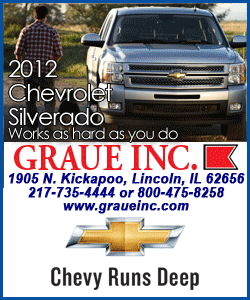 Early in the meeting, aldermen realized they were addressing
issues in two different city ordinances: one pertaining to
street-side parking and the other addressing parking of vehicles on
private property. They decided to take these on one at a time,
dealing with street-side parking first. Early in the meeting, aldermen realized they were addressing
issues in two different city ordinances: one pertaining to
street-side parking and the other addressing parking of vehicles on
private property. They decided to take these on one at a time,
dealing with street-side parking first.In the end, the committee
decided to recommend that the full council tighten restrictions on
street-side parking of trailers, boats and campers, but ran out of
time before they were able to make a decision regarding parking
these same items on private property.
The issue of street-side parking came to the council at the last
committee of the whole meeting, on May 30, when Lincoln resident and
small-business owner Darin Coffey asked the council to ease the
restrictions on street-side parking.
Coffey had received a letter from the city stating he was in
violation of the ordinance because he parked the trailers he uses
for his business on the street in front of his home.

Tuesday evening Alderman David
Wilmert opened up discussion by stressing a need for provisions to
the current city ordinance that says the parking of vehicles, boats,
trailers and campers on any city street for a period greater than 72
hours constitutes an obstruction of the street. In addition, those
vehicles are not allowed to be stored on the front-yard area of a
property.
Wilmert would like to see an adjustment in city code to allow
citizens to store these types of vehicles on their own driveway.
John Lebegue, building and safety officer, agreed with the need
for a change in code, as some individuals situated on a corner lot
have two front yards, making it difficult
for them to store their vehicles on their own property in
accordance with the existing ordinance.
Alderwoman Stacy Bacon also voiced concern over citizens, such as
herself, who do not have access to their backyards via an alleyway
in order to park their vehicle. She was in agreement with allowing
citizens to park their vehicle in a driveway.
Lebegue prepared a slide show of various photos depicting the
problems associated with street-side parking of these vehicles. The
photos showed vehicles parked on various city streets. Oftentimes
the photos illustrated a possible obstruction to the flow of
traffic, particularly on narrow avenues.
Police Chief Ken Greenslate followed the slide show by explaining
the necessity for a new approach toward the enforcement of this city
code.
Greenslate explained that his officers place a sticker on
vehicles parked street-side for longer than 72 hours, but the owners
of said vehicles peel the sticker off and move the vehicle an inch,
thereby making them legal for another 72 hours. There are currently
no legal ramifications for taking this sticker off.
Wilmert countered by drawing the line between the ordinance
itself and the enforcement of said ordinance. He was in favor of the
72-hour regulation for citizens who aren't perpetually leaving their
vehicles on the street for extended periods of time, such as those
unloading or those who use trailers for their business. He was,
however, not happy with the way the ordinance is being enforced.
[to top of second column]
 |

Alderwoman Marty Neitzel put emphasis on the fact that she wants
to keep Lincoln beautiful and also agreed that these vehicles should
not be parked on city streets, but rather stay confined to
driveways.
Alderwoman Melody Anderson echoed these views by saying that
vehicles should only be parked street-side for loading and
unloading.
Four out of five committee members -- O'Donohue, Neitzel, Tibbs
and Anderson -- were in favor of making an ordinance change that
would ban all trailers, boats and campers from parking street-side.
Alderman Jeff Hoinacki was the lone dissenter, feeling that an
outright ban would alienate many residents without suitable driveway
space.
The committee moved to make a recommendation to the city council
banning trailers, boats and campers from parking on the street.
During the committee of the whole meeting later in the evening,
O’Donohue told the full council the committee had met, but had
decided to hold off on adding anything to the agenda right now. He
indicated the council had run out of time to discuss all the issues.
The committee also addressed the ordinance banning trailers,
boats and campers from being parked on a resident’s property, such
as their driveway or a slab near their driveway.
Bacon reiterated the fact that some residents lack access to
their backyard, and therefore they should be able to store their
vehicle on a driveway, be it gravel, concrete slab, etc. She
stressed her concern with vehicles being parked on a bare lawn.
Wilmert echoed this; however, he felt that residents should be
able to store a vehicle anywhere on their own property.

Hoinacki said he would like to see parked trailers equipped with
a tarp or cover so as to make them look more presentable and to
avoid hazardous debris from exposure.
Lebegue presented more photos to the council, this time depicting
vehicles stored in front yards. In particular, Lebegue said he’d
received multiple calls regarding a large camper on Nicholson Road
that extended into the right of way.
As the hour of 7 p.m. was approaching and the committee needed to
adjourn to prepare for the workshop meeting, O’Donohue said he would
like to continue these discussions in another committee meeting. He
called for that second meeting to be at 6 p.m. on June 26.
[By SAM WOOD]
Past related article
|